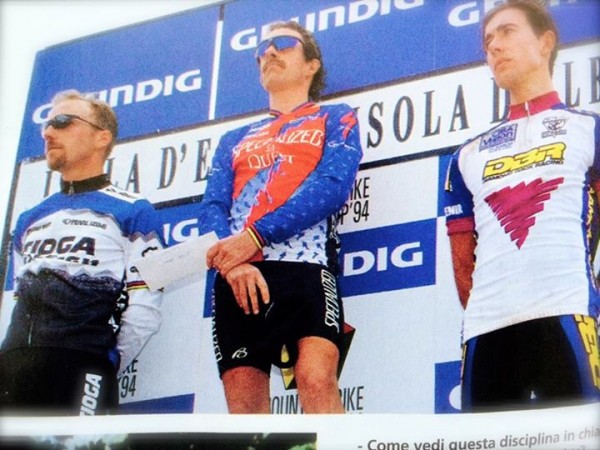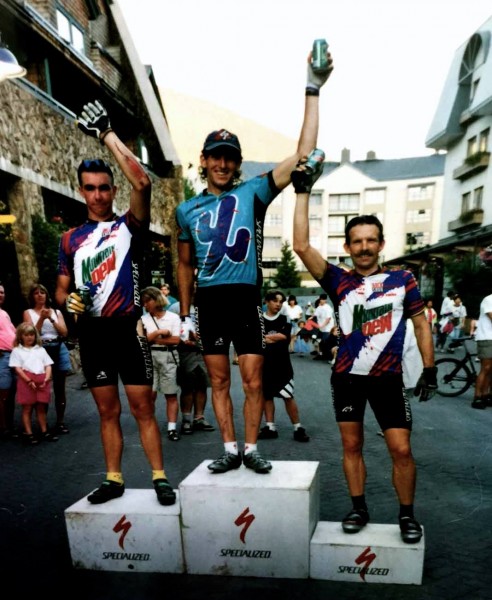Velonews published an article a couple weeks ago, from an excerpt of a book (Fast after 50), by Joel Friel, about Ned (Overend) and his preferred training method of intervals and intensity.
One of the statements in Joel’s book is – research on aging in experienced endurance athletes generally supports the notion that in order to reduce the decline in aerobic capacity with advancing age, training must be intense.
I’m not sure this is actually true. What word I dislike there is “must”.
Actually, let’s get back to Ned and his training. I haven’t been training with Ned recently, but I did train a ton with him when he was in his forties. I do know that Ned doesn’t ride much. He definitely rides a lot less than most of us and his results are stellar. The quote that I believe describes this best is – I have a short attention span for training rides.
And Ned does train hard nowadays. Just taking gander at some of his rides on Strava show just how hard. Like race hard sometimes. But, does that apply to the rest of us?
I don’t think so.
Here’s how I’ve trained most of my cycling life and it seems to work. And it is pretty exactly opposite of how Ned rides.
I like to race. The reason I train on a bike is so that I can race. That statement isn’t meant to mean the reason I ride a bike is to race, but the reason I train is to race. And I like to race.
I think it is impossible to train as hard as you can race. At least for the majority of us. I suppose if you had someone at your disposal to motorpace you at random times throughout training rides, then it would be easier to try to emulate racing through training, but that isn’t available to most of us.
Somehow, the last decade or so, “the Pros” have convinced us that you can just go out and do training blocks for months at a time and come to an event race fit. This is complete bullshit. Those guys were usually doing some really screwy things, much which is not legal within the rules of the sport.
I think to be race fit, you need to race. And I don’t think it is possible to train as hard as you can race. I can go out and train and train, as intense as possible, and then when I do the first race of the season, I am surprised to death about how hard it is and how blown I am.
All these new internet coaches have signed off on this “pro mentality” and are jacking up local train rides all over the country. Everyone has been told that they need to go and train for power and intensity. You have to be using a power meter with a heart rate monitor to get the most out of training, to the exclusion of doing group rides. That isn’t necessary, in my experience. Bike racing is way more complex than how much power you can put into the pedals.
I do race a lot, normally. And maybe I’m lazy as Ned too, and don’t like to train hard, I don’t know. I try to ride hard training, but not anywhere as hard as Ned does now. But racing, local training races, or regional races, or even National caliber stage races, allow me to change fitness levels. It is impossible to get to race form without racing. I’d even say that racing twice a week would be better than just training 7 days a week, if that were your options.
An ancillary story about Ned and his training. We headed over to Europe to do the MTB World Cups in 1994. (This probably the last year of normally aspirated MTB riding before the sport got super polluted with drugs) . Ned was nearly 40 then. We’d first raced in Madrid to race in Spain and both of us, Ned and I got pretty smeared. Me way worse than Ned. I was never good for the first race I did after flying east to Europe. Then we flew to Italy and took a ferry to Elba, an island off the coast, where they exiled Napoléon Bonapart. (They gave him sovereignty over the island and allowed him to retain his title of emperor.)
Anyway, I told Ned that he needed to train more. I got him to do a couple big rides. I got him to ride the perimeter of the island and then go to the course and ride a lap. I think the ride was close to 100 miles, on our MTB bikes, and the course was super hard, straight up and then straight down. Really hard training day. (We met up with Tinker, riding the other way, with his backpack, about 1/2 way through that ride.)
Fast forward to the weekend and Ned wins the World Cup and I finished somewhere in the top top, which would have been good for me.
Same thing happens later that season. I was riding with Ned in Durango and go him to go out on some long rides, at least for him. Next thing I know, Ned tells me he is buying a ticket to Switzerland to ride the World Cup there. He asked me if I wanted to go. I tell him he is crazy flying to Europe for one race. He goes and wins. That was the last World Cup he won, I think.
So I think, personally, that Ned rode his best when he did some longer rides, even though it was like pulling teeth to get him to do it.
Ned is very good at choosing when to race. He rides until he is going good and then finds a race that suits his abilities. Or he finds races that suit his abilities and then trains for it. Plus, you have to realize that Ned is a physiological freak. He has an amazing VO2 and that is genetic, not training.
I use more of the shotgun method. I do just about any race I can find. I don’t really care if I’m fit enough or not. I use the races to get race fit, then try to find races that suit my abilities and do well. And, I have just good genes, but nothing off the top charts.
 Ned and Johnny T. on the podium in Elba, Italy. It was a super exciting race. Here is a link to Ned’s Facebook page on it.
Ned and Johnny T. on the podium in Elba, Italy. It was a super exciting race. Here is a link to Ned’s Facebook page on it.
 Todd Wells, Ned and I on the podium after the Fatboy Criterium in Whistler, Canada. I’m not sure how Ned finished 3rd in that? He wasn’t normally too interested in those events. Todd is obviously missing some skin.
Todd Wells, Ned and I on the podium after the Fatboy Criterium in Whistler, Canada. I’m not sure how Ned finished 3rd in that? He wasn’t normally too interested in those events. Todd is obviously missing some skin.





I agree that high intensity gets you into race shape but the lower intensity training is what enables most of us to keep that form. I think alot of people could go race into shape but how long would that form last before they fell apart.
Also, not speaking from experience but with alot of masters that have been racing for along time I think the have the physiological base from years of riding to not need to go slog out 100 mile rides to get in shape. The intensity is what does it for them. I think at some point after years of riding your body developed a permanent base of some sort.
It’s different strokes for different strokes I’d say. I can tell you that in my own experience, Ned’s method does work. If I ride the big miles and the long hours, I just get tired. I like the long rides at times and can ride forever, but I’ll be tired. On the other hand, when I have been diligent about training very hard for a max of 1.5 hours at a time followed by proper nutrition and then good rest, I find that my intensity is right there and I’m not tired. That concentrated training resulted in my best results. Low hours-super high intensity works for some people and I’m one of them.
I meant to say different strokes for different folks..
Steve, you only having ‘good genes’?
Didn’t you expound awhile ago about your brief foray into foot racing and nearly breaking the 4 min mile at K-State or something?!?! ‘Good genes’; you are a bit modest.
I wonder what my excrement filled gene pool I’m working with would be called…
Love the stories of the older MTBing days…
Steve,
This is exactly why strong riders/racers don’t always make good coaches. “Just do what I do because I’ve always been a great rider” will only work for a few with great genetics.
For the majority of us, form & fitness don’t come naturally. I know from experience that I simply must put in more work than others to be able to ride with them (be it longer, harder or a combo of both). Friel has the benefit of having worked with many, many riders across the spectrum – including the Ned’s of the world. N = many vs N = select few.
The problem with excerpts is that they are just that, part of the story. Joel Friel is selling books … to do that you have to have a message … his is “intensity”. Taken in it’s entirety the book is pretty clear. As you crack 50+ you have to (1) Eat better, (2) Listen to your body and rest when needed (3) Train consistently and (4) Don’t just do long steady training. If you break up his recommended 3 main sessions you get VO2Max training, Lactate Threshold training and LONG aerobic training. Add in recovery training and you are back to the Praedo principle (80/20). Steve is getting his intensity racing … that is cool. If you don’t like to race or cannot do enough then Friel’s book gives some the map to maintaining it …
Racing fitness like match fitness in other sports can only be gained by being in the game … unless you just do TT’s. I do agree with Steve on the current crop of coaches using pro techniques on non-pro’s …
YMMV
Both you and Ned lapped me at REAX Ski area at a Specialized Cup race. I believe you won the race and Ned came in second. Did you guys have it worked out in the beginning who would win? Or were you just going really good that day. That probably was the same trip you climbed Mt. Fuji?
Hehe- form and fitness don’t come naturally- he might be on to something after all. Anyone reading this think Ned WINNING races at almost 60 is natural? If you do, I have a Chris Horner sponsorship to sell you…
I bought Joel’s book and thought it was excellent. What I took from the book was that after a certain age in life, to maintain, or slow down the loss of aerobic capacity you have to do high intensity training. Steve you do that with racing, some folks do that by fartlek (riding really hard at times) and others do that with Vo2 max intervals. It doesn’t really matter which method you use as long as you do one. Also it needs to be do year round (you race cyclocross in winter and road in spring and summer so there is your year round). Joel says just riding long and slow is not going to maintain aerobic capacity which is what a lot of older riders seem to gravitate to. Joel also stresses the need to recovery after hard training. Kind of emphasizes the old “when you go hard go really hard and when you go easy, go real easy” . Ok got to go , time to head out to our Tuesday worlds and get my dose of aerobic capacity training in…..
steve, why dont you race time trials? they are all over and they sure help get you race fit.. been following your blog a few years now and other that an uphill tt in arkansas,, i never see you reporting on any.. there are tt series from 10 miles to 40k in every state weekly thru the spring and summer….personally i’d like to see how a road racer at your level does in a 40k..
Define “doesn’t ride much.”
I see plans out there for race-fitness in 6 hours weekly, which suggests a big time savings for busy folks.
Yet, my neighbor thinks I’m crazy for riding my bike 10 hours a day.
“Much” is different to different folks, so I wonder what sort of time you’re speaking about with Ned.
So Ned is the natural Merckx then. Would he be the best cyclist ever if he “rode lots” instead?